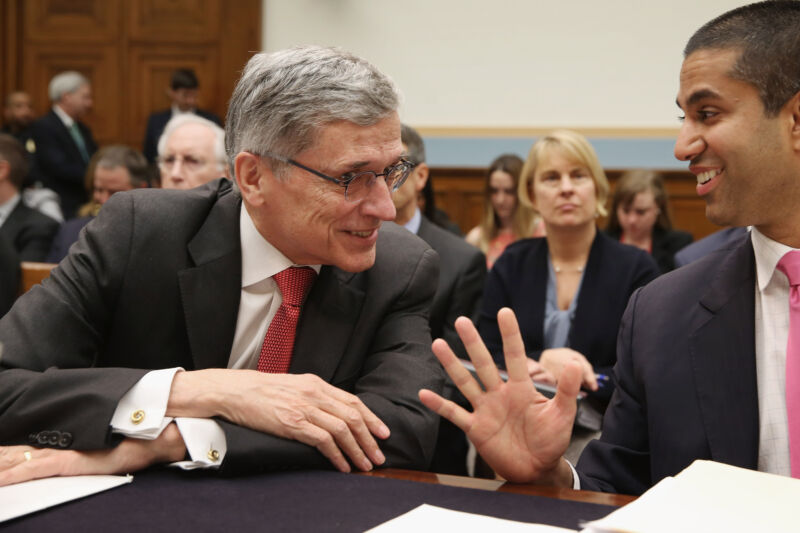
Six former chairs of the Federal Communications Commission yesterday criticized the Federal Aviation Administration’s fight against a new 5G rollout on spectrum that the FCC has studied and deemed safe to use. Republicans Ajit Pai and Michael Powell joined with Democrats Tom Wheeler, Mignon Clyburn, Julius Genachowski, and Michael Copps in writing a letter describing their concerns about how the FAA has tried to undermine public confidence in the FCC’s decision-making process.
“The FAA should work with the FCC and the National Telecommunications and Information Administration (NTIA)… to assess and resolve the FAA’s concerns expeditiously, but this debate should not be fought publicly in a way that undermines consumer confidence in the process, nor should it require months of additional delays,” said the six former chairs’ letter, which was sent to FCC Chairwoman Jessica Rosenworcel and NTIA acting Administrator Evelyn Remaley.
The “FAA position threatens to derail the reasoned conclusions reached by the FCC after years of technical analysis and study,” the former chairs also wrote.
AT&T and Verizon have already delayed their 5G launches on the new spectrum to assuage the FAA’s concerns, but the carriers plan to move ahead with the deployments next month.
No evidence of harm
Nearly 40 other countries are using C-band spectrum for 5G without any reports of interference to airplanes’ radio altimeters. As we wrote previously, the FCC in February 2020 approved mobile carriers’ use of C-Band spectrum from 3.7 to 3.98 GHz only after analyzing the aviation industry’s interference claims and finding no credible evidence of harm to altimeters, which use spectrum from 4.2 to 4.4 GHz.
To be safe, the FCC required carriers to follow power limits and created a 220 MHz guard band that will remain unused to protect altimeters from any possible interference from 5G transmissions. The FCC decision said the aviation industry’s research was unrealistic and that “well-designed equipment should not ordinarily receive any significant interference (let alone harmful interference) given these circumstances.”
Over a year after the aviation industry’s objections were dismissed by the FCC due to a lack of evidence, unnamed FAA officials tried to revive the debate by leaking their concerns to The Wall Street Journal. The FAA followed that up by issuing a November 2 bulletin that warned of “potential adverse effects on radio altimeters” even though the FAA bulletin acknowledged there have been no “proven reports of harmful interference” in the many countries where this spectrum is already used.
Former chairs say FCC acted on the evidence
The former FCC chairs’ letter said the agency’s 2020 decision on C-band spectrum “followed almost two years of careful review of the public record,” during which other federal agencies were given the chance “to raise—and defend with reliable data—their concerns about interference from transitioning spectrum to new uses.”
“At the end of this process, an FCC decision is reached that reflects the input of all stakeholders and its technical experts on the effective transition of spectrum, consistent with its statutory charge to ensure that new systems do not cause harmful interference,” the former chairs wrote. “In turn, this decision-making approach provides wireless companies or other license holders with the confidence necessary to invest in the networks that will deliver the innovation that will ensure the US remains the technology leader of the world.”
That’s how it’s supposed to work, but the FAA actions threaten to derail the process, the letter concluded:
In this case, the FAA position threatens to derail the reasoned conclusions reached by the FCC after years of technical analysis and study. We encourage all stakeholders to work together toward a speedy resolution of the issues in this band, and to ensure these surprises do not become a recurring feature of American spectrum management in the future.